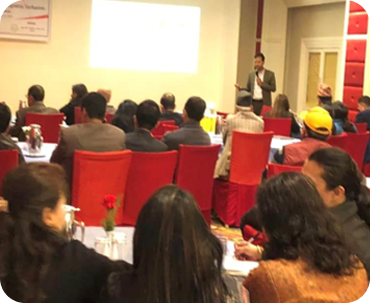On 24 March 2023, the National Disaster Management Network (DiMaNN), in partnership with the National Platform for Disaster Risk Reduction (NPDRR) under the National Disaster Risk Reduction and Management Authority (NDRRMA), organized a workshop with technical support from Habitat for Humanity and Action Aid Nepal at Hotel Himalaya in Lalitpur. The event was held and focused on the Disaster Risk Reduction (DRR) Sectoral Integration Mechanism. The workshop aimed to bring together key stakeholders from various sectors to engage in discussions and exchange ideas on the mainstreaming of DRR into their respective fields. The gathering provided a platform for experts and practitioners to share their experiences and insights, explore collaborative opportunities, and identify challenges in integrating DRR across sectors.
The program was chaired by Mr. Surya Bahadur Thapa, Chairperson of DiMaNN and Member Secretary of the National Platform for Disaster Risk Reduction (NPDRR), with Mr. Anil Pokharel, Chairperson of NPDRR and Executive Director of the National Disaster Risk Reduction and Management Authority (NDRRMA), serving as the Chief Guest.
Various speakers presented at the workshop, highlighting the importance of integrating disaster risk reduction (DRR) into different sectors. Dr. Raju Thapa emphasized the need for cooperation and coordination in sectors such as agriculture, water resources, infrastructure, tourism, and health to improve disaster risk management. He provided recommendations for each sector, including implementing climate-smart practices, building resilient infrastructure, and integrating DRR into planning and policies.
Mr. Raju Chapagain discussed policies and regulations related to shelter from a DRR perspective, emphasizing the importance of safe and secure housing for human dignity and stability. He called for proper land management and housing policies to protect communities from potential disasters.
Mr. Anil Pokhrel highlighted the challenges faced in housing, financing, and loans, and stressed the need to mainstream disaster risk financing. He discussed initiatives for building resilient housing and the importance of local disaster resilience frameworks.
Other speakers, including Mr. Dhruba Bahadur Khadka, Under Secretary and Spokesperson of NDRRMA, Ms. Anita Niraula, Joint Secretary of NDRRMA, and Mr. Shyam Sundar Jnavaly of NDRC Nepal, also emphasized the importance of integrating DRR into development planning and activities across sectors to reduce vulnerabilities and enhance resilience.
During an open discussion session on disaster risk reduction (DRR), several suggestions were put forward to integrate DRR into various sectors. The proposed measures include conducting risk assessments, developing resilience plans, and implementing climate-resilient practices. Sectors such as agriculture, business, biodiversity, climate, disability, gender, environment, education, food and nutrition, health, irrigation, infrastructure, and roads and transport were all considered. Additionally, the discussion highlighted the need to address specific questions for each sector based on the priorities of the Sendai Framework for Disaster Risk Reduction (SFDRR). These priorities include understanding disaster risk, strengthening disaster risk governance, investing in DRR for resilience, and enhancing disaster preparedness and response. The suggested measures aim to involve communities, improve information exchange, build capacity, and ensure coordination among stakeholders. By integrating DRR across sectors and addressing key priorities, communities can enhance their resilience and effectively manage disaster risks.
During the workshop, experts and practitioners emphasized the need for continuous improvement in disaster risk management. They discussed various sectors that should be involved, such as agriculture, water resources, environment, health, education, infrastructure, and many others. Additional sectors discussed included finance, media, gender, humanitarian aid, and indigenous knowledge. The workshop highlighted the challenges faced in accessing safe housing and stressed the importance of proper land management and housing policies for disaster protection. Key messages from the speakers emphasized the impact of disasters on businesses and the economy, the importance of anticipatory action, and the need for improved data collection and analysis. Other important themes included mental health and psychosocial support, the role of the media in disseminating information during disasters, and the integration of disaster planning for women and children. The speakers also emphasized addressing the needs of vulnerable populations and tackling the root causes of vulnerability.


Leave A Comment